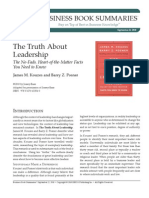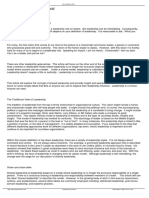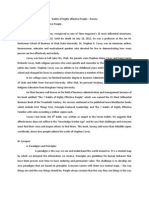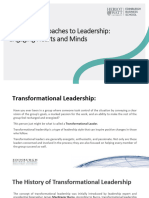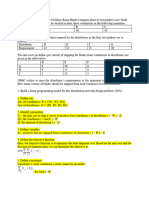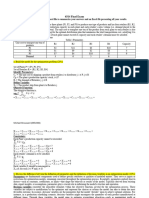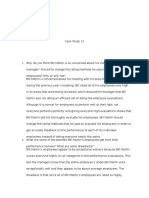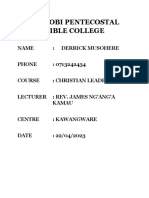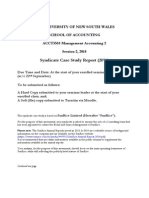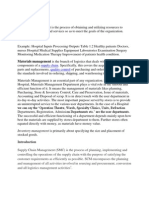Book Report
Book Report
Uploaded by
mikeCopyright:
Available Formats
Book Report
Book Report
Uploaded by
mikeOriginal Description:
Copyright
Available Formats
Share this document
Did you find this document useful?
Is this content inappropriate?
Copyright:
Available Formats
Book Report
Book Report
Uploaded by
mikeCopyright:
Available Formats
1
Michael Broussard
TELS 3340
11/22/2014
Book Report (Principled Centered Leadership)
This book report is based on the book Principled Centered
Leadership, written by Stephen Covery. The book is published by his cofounded publishing company, Franklin Covey on Brilliance Audio. Stephen
Covey is known for being a keynote speaker and author of his most popular
book and best seller, The Seven Habits of Highly Effective People. Time
magazine named Covey in the past as one of the most influential Americans
and Forbes Magazine called The Seven Habits of Highly Effective People
one of the top ten business management books. He is also known as one of
the worlds leading voices on empowerment. Hundreds of corporations have
implemented his innovative techniques on leadership and innovation. In the
following report of Principled Centered Leadership, I will summarize its
contents and relate some of its concepts to the textbook Leadership and
Michael Broussard
0951900
Supervision. The main idea of the book is that leadership should be directed
by principles. Covey defines four levels of leadership and key principles that
should be surveyed by great leaders and students.
Covey begins his book in Chapter one defining eight traits of principle
centered people. These traits coincide with parts of our discussion of traits of
successful leaders in Chapter nine. Outlined are the following: They are
continually learning, as discussed influencing others require a level of
intelligence and an effective leader has a high degree of relevant
knowledge(Robbin,230). They are service oriented people, life is a mission
for them and not a career. Also they radiate positive energy daily .They have
faith in other people and want to help growth. This was discussed in our
textbook that leaders have a clear desire to influence others and builds
trusting relationships with those they influence (Robbins, 230). They lead
balanced lives and the see life as adventurous. Also they are synergistic and
exercise self-renewal to better themselves. Coveys messages relates to
leadership and supervision in our textbook Supervision Today, throughout
in one aspect or another. These characteristics and traits discussed in
chapter one are in close correlation with the seven unique human
endowments discussed in chapter two, which are for useful purposes divided
into two categories: primary and secondary endowments accompanied in
highly effective people. Chapter three discusses that sometimes our
resolutions will fail without character and social reinforcements. Coveys aim
in Chapter five is to create a paradigm shift in management training. While
Michael Broussard
0951900
a person may make small improvements by developing new skills, quantum
leaps in performance and revolutionary advances in technology require new
maps, new paradigms.(Covey, 911). Covey states that the training design
that matches the paradigm is process, not product oriented. And the
development process is to gather and diagnose data, second to select
priorities, values & objectives. Third to Identify and evaluate alternatives.
Forth plan & decide action steps. Fifth compare results with your original
goals and objectives. Lastly, He states that past habits have a tremendous
pull on how you do things now and makes change difficult. There are three
forces that direct us back to our bad habits such as appetite and passion,
pride and determination. Chapter six, Covey compares the creation of the
developmental process to the creation of the world in the bible book,
Genesis. In the bible, the earth was created in six days. As each day was
important, the arrangement was also significant. Simpler he believes that
there are no short-cuts in the developmental process. Chapters seven and
eight discuss what covey describes as his seven deadly sins wealth without
work ,pleasure without conscience, knowledge without character , business
without ethics, science without humanity , religion without sacrifice and
politics without principle . Moral compassing is needed when managing in of
changing times and is similar to our class discussion of ethics. Acting
ethically can free us of our moral crises. Chapter ten in Supervision Today
, is important to Coveys chapter ten as they work together. It states that
perception problems are often the root of communication barriers. Our
Michael Broussard
0951900
textbook perceives perception as one of the barriers of communication.
Section two of Principled Centered Leadership focuses more so on the
Managerial and organizational development of businesses. Of these
chapters I found some to be interesting, specifically would be Coveys
thoughts on problem solving. From experience Ive seen that involving
people in problem solving helps a lot as they feel meaningful. Change
becomes easier with help. Also peoples concerns feel more justified and
encouraged. This can all increase the drive in the workplace.
Although Principle Centered Leadership seemed to drag on it can be
a noteworthy read for any member of a business or organization looking to
better themselves. It concentrates on individuals and their functions in their
everyday family life work place. After reading and analyzing the many points
in the book, his main message seems to be that one should construct
character from inside and one should be based on ethical principles.
Concentrate on building trust and effective interaction with others which will
allow you to direct yourself and others at the workplace and your household.
Michael Broussard
0951900
Works cited
Covey, S. R. (1992). Principle-centered leadership. New York: Simon &
Schuster.
Robbins, DeCenzo (2013). Supervision Today - Pearson. 7th Ed. Prentice Hall
Michael Broussard
0951900
Michael Broussard
0951900
You might also like
- Social Studies SHS 1 - 3 (2010)Document56 pagesSocial Studies SHS 1 - 3 (2010)Leslie N.T. Annan77% (66)
- Reviewing Leadership (Engaging Culture): A Christian Evaluation of Current ApproachesFrom EverandReviewing Leadership (Engaging Culture): A Christian Evaluation of Current ApproachesRating: 5 out of 5 stars5/5 (1)
- Organization&ManagementDocument7 pagesOrganization&Managementjin_adrian40% (5)
- BBS The Truth About LeadershipDocument10 pagesBBS The Truth About LeadershipIrwin TaputuaraiNo ratings yet
- CFLM2CR Module 1Document11 pagesCFLM2CR Module 1fernando jose Dancil100% (2)
- The Little Book of Leadership Development: 50 Ways to Bring Out the Leader in Every EmployeeFrom EverandThe Little Book of Leadership Development: 50 Ways to Bring Out the Leader in Every EmployeeNo ratings yet
- Lee's Leadership ListDocument4 pagesLee's Leadership ListLeland BeachyNo ratings yet
- PGPM StudynoteDocument18 pagesPGPM StudynoteManojJainNo ratings yet
- Book Review: The 7 Habits of Highly Effective People by Stephen R. Covey: The keys to successFrom EverandBook Review: The 7 Habits of Highly Effective People by Stephen R. Covey: The keys to successNo ratings yet
- Moral Purpose Writ Large: The Pressing Goal Is To Infuse Spiritual Force Into All EducatorsDocument6 pagesMoral Purpose Writ Large: The Pressing Goal Is To Infuse Spiritual Force Into All EducatorsKhairu DinNo ratings yet
- Transformissional Coaching - Book ReviewDocument6 pagesTransformissional Coaching - Book ReviewJason FletcherNo ratings yet
- 8th Habit - Covey.#2 - EBSDocument11 pages8th Habit - Covey.#2 - EBSshubhamNo ratings yet
- Leading and Managing - Reflective EssayDocument9 pagesLeading and Managing - Reflective EssayAmélieNo ratings yet
- TruthAboutLeadership BBS PDFDocument8 pagesTruthAboutLeadership BBS PDFvvishaljaswaNo ratings yet
- Navarro Sample 1 - Leadership Philosophy - Refl L-ShipDocument9 pagesNavarro Sample 1 - Leadership Philosophy - Refl L-Shipapi-353911563No ratings yet
- Bass Transformational Leadership TheoryDocument28 pagesBass Transformational Leadership TheoryRhoda Maron-Gaddi Isip100% (1)
- Summary of BookDocument8 pagesSummary of BookVishal Singh JaswalNo ratings yet
- Basic Approaches To Leadership Chapter 12 0Document32 pagesBasic Approaches To Leadership Chapter 12 0Basnet BidurNo ratings yet
- My Beliefs About Leadership 11-8-11Document22 pagesMy Beliefs About Leadership 11-8-11api-147387005100% (1)
- 8 RetrospectiveDocument9 pages8 Retrospectiveapi-742880860No ratings yet
- Leadership Philosophy FinalDocument14 pagesLeadership Philosophy Finalapi-277437185No ratings yet
- Essay About The Seven Habits of Highly Effective People by Stephen CoveyDocument3 pagesEssay About The Seven Habits of Highly Effective People by Stephen Coveyjummabaloch1986No ratings yet
- Leadership vs. ManagmentDocument15 pagesLeadership vs. ManagmentAbdul RehmanNo ratings yet
- Grenier Leadership Philosophy FinalDocument15 pagesGrenier Leadership Philosophy Finalapi-248408321No ratings yet
- Reflection PaperDocument4 pagesReflection PaperMa. Theresse Cathlene Alyzon TorlaoNo ratings yet
- Leadership, Decision MakingDocument10 pagesLeadership, Decision MakingVina De La Paz100% (1)
- Book ReviewDocument8 pagesBook ReviewRahima RajputtNo ratings yet
- Its A Shared Leadership World: Contributed by Don FrederiksenDocument5 pagesIts A Shared Leadership World: Contributed by Don FrederiksenBhaktha SinghNo ratings yet
- Creating Leaderful Organizations: How to Bring Out Leadership in EveryoneFrom EverandCreating Leaderful Organizations: How to Bring Out Leadership in EveryoneRating: 5 out of 5 stars5/5 (1)
- OXF MNB M1U3 Video 1 Part 1 TranscriptDocument4 pagesOXF MNB M1U3 Video 1 Part 1 Transcripta.makhnovaNo ratings yet
- When To Change How You LeadDocument7 pagesWhen To Change How You Leadalberto micheliniNo ratings yet
- A Book Summary - Principle-Centered Leadership (Rexford)Document9 pagesA Book Summary - Principle-Centered Leadership (Rexford)Jeffery AyembillaNo ratings yet
- 14 NaveedDocument12 pages14 NaveedQaiser AminNo ratings yet
- Breakthrough Leadership: How Leaders Unlock the Potential of the People They LeadFrom EverandBreakthrough Leadership: How Leaders Unlock the Potential of the People They LeadNo ratings yet
- Stephen Covey Biography: Profound Wisdom for Personal Growth and EmpowermentFrom EverandStephen Covey Biography: Profound Wisdom for Personal Growth and EmpowermentNo ratings yet
- Leadership PhilosophyDocument8 pagesLeadership PhilosophyAaron BaldwinNo ratings yet
- Leading Learning and Legacies:: The Principles of Successful LeadershipFrom EverandLeading Learning and Legacies:: The Principles of Successful LeadershipNo ratings yet
- Self-Leadership: Why It MattersDocument5 pagesSelf-Leadership: Why It MattersCojjo XenonNo ratings yet
- Culmination Paper Ldrs 595Document8 pagesCulmination Paper Ldrs 595api-429819933No ratings yet
- The Spiritual Manager: How to Bring Heaven's Influence to your WorkplaceFrom EverandThe Spiritual Manager: How to Bring Heaven's Influence to your WorkplaceRating: 5 out of 5 stars5/5 (1)
- 3 Leading in A Culture of Change Chapter 2 Moral Purpose (Fullan)Document13 pages3 Leading in A Culture of Change Chapter 2 Moral Purpose (Fullan)Amy JacksonNo ratings yet
- Covey Effective PeopleDocument31 pagesCovey Effective PeoplecpdahbNo ratings yet
- Principal Centred Leadership - Covey.ebsDocument6 pagesPrincipal Centred Leadership - Covey.ebsAbebe MenedoNo ratings yet
- Synthesis Paper 6Document40 pagesSynthesis Paper 6api-281265917No ratings yet
- An Examination of John C. Maxwell's The 5 Levels of Leadership TheoryDocument5 pagesAn Examination of John C. Maxwell's The 5 Levels of Leadership TheorydntllspslghNo ratings yet
- Personal Leadership Development PlanDocument10 pagesPersonal Leadership Development PlanDrogNo ratings yet
- "Good" LeadershipDocument5 pages"Good" LeadershipSyidiq Nack RajinNo ratings yet
- Leading From WithinDocument314 pagesLeading From WithinAcuy Sang PemimpiNo ratings yet
- 7 Habits of Highly Effective People Book Review PDFDocument4 pages7 Habits of Highly Effective People Book Review PDFHerzl Hali V. Hermosa0% (1)
- Psychology of LeadershipDocument10 pagesPsychology of LeadershipOyedele AjagbeNo ratings yet
- M1 Introduction To The Philosophy of Servant-Leadership 2012Document26 pagesM1 Introduction To The Philosophy of Servant-Leadership 2012Sarah Lorene BlanchardNo ratings yet
- Reviewing Leadership 4-MAT Book ReviewDocument9 pagesReviewing Leadership 4-MAT Book ReviewabouhasinNo ratings yet
- Teaching Leadership in The EMBA Where To BeginDocument6 pagesTeaching Leadership in The EMBA Where To BeginPriscilla BerryNo ratings yet
- Book Review FinalDocument11 pagesBook Review FinalXaad ZebNo ratings yet
- Leadership Philosophy FinalDocument15 pagesLeadership Philosophy Finalapi-247669843No ratings yet
- The7HabitsofHighlyEffectivePeople NEWDocument5 pagesThe7HabitsofHighlyEffectivePeople NEWestherNo ratings yet
- LeadershipDocument31 pagesLeadershipCrystal Fairy-DustNo ratings yet
- Session 4 Modern Approaches To Leadership...Document24 pagesSession 4 Modern Approaches To Leadership...Csec helper1No ratings yet
- Homework 1 Spring 2024Document7 pagesHomework 1 Spring 2024mikeNo ratings yet
- 6314 Final Exam (Michael B) CorrectedDocument17 pages6314 Final Exam (Michael B) CorrectedmikeNo ratings yet
- Why Does The Devil PDFDocument29 pagesWhy Does The Devil PDFmike100% (5)
- Islamic YogaDocument21 pagesIslamic YogaTruman DhanishNo ratings yet
- CS12Document3 pagesCS12mikeNo ratings yet
- Strategic Business Plan For Coogies & MoreDocument4 pagesStrategic Business Plan For Coogies & MoremikeNo ratings yet
- CS11Document1 pageCS11mikeNo ratings yet
- The Impact of Colaboration Among Members On Team's Performance-With-Cover-Page-VDocument15 pagesThe Impact of Colaboration Among Members On Team's Performance-With-Cover-Page-VAdi Tri SetiawanNo ratings yet
- 2023-2024-ENGLISH-6 - PERIODICAL-TEST - 2ND-QUARTER (Repaired)Document6 pages2023-2024-ENGLISH-6 - PERIODICAL-TEST - 2ND-QUARTER (Repaired)Cindy FormenteraNo ratings yet
- NPB DadDocument6 pagesNPB Dadantony luvaleNo ratings yet
- Vocabulary Project ManagementDocument3 pagesVocabulary Project ManagementJésica González BuenoNo ratings yet
- A Case Study On Philippine AirlinesDocument59 pagesA Case Study On Philippine AirlinesbrantchikoyNo ratings yet
- Business Standard Campus Talk - February IssueDocument9 pagesBusiness Standard Campus Talk - February IssueSoumyadeep MaityNo ratings yet
- Erp KPL Jul16Document192 pagesErp KPL Jul16sriiyer85No ratings yet
- Syndicate Case Study Report DetailsDocument3 pagesSyndicate Case Study Report Detailscourtney.hodaNo ratings yet
- Grameen PhoneDocument11 pagesGrameen PhoneBahar UddinNo ratings yet
- Prabir JhaDocument21 pagesPrabir JhaNeetu SinghalNo ratings yet
- Bartlett 2020Document23 pagesBartlett 2020sCore IELTSNo ratings yet
- Key Takeaways: Takeaways From Leadership Development CourseDocument6 pagesKey Takeaways: Takeaways From Leadership Development CoursemmsrajuNo ratings yet
- Indian Ethos and Ethics - FinalDocument5 pagesIndian Ethos and Ethics - FinalSAURABH SINGHNo ratings yet
- IE 31: Industrial Organization and Management Lecture 1: Introduction To Organizations and ManagementDocument33 pagesIE 31: Industrial Organization and Management Lecture 1: Introduction To Organizations and Managementhannah30No ratings yet
- Basic Functions of Healthcare FieldDocument10 pagesBasic Functions of Healthcare FieldShraddha BendkhaleNo ratings yet
- Balance Scorecard of Sales Executive of Electrical Appliances CompanyDocument2 pagesBalance Scorecard of Sales Executive of Electrical Appliances CompanyAlka AggarwalNo ratings yet
- Frankel 2006Document20 pagesFrankel 2006Maria MorenoNo ratings yet
- Monsters, Inc.: Toxic Leadership and EngagementDocument13 pagesMonsters, Inc.: Toxic Leadership and EngagementRudiSalamNo ratings yet
- Unit 2Document5 pagesUnit 2Mahesh UgalmugaleNo ratings yet
- Stp41 - 38b14 Soldier's Manual and Trainer's Guide, Mos 38b, Civil Affairs Soldier, Skill Levels 1 Through 4Document272 pagesStp41 - 38b14 Soldier's Manual and Trainer's Guide, Mos 38b, Civil Affairs Soldier, Skill Levels 1 Through 4tnsriderNo ratings yet
- People HospitalDocument32 pagesPeople HospitalkharemixNo ratings yet
- Personal Effectiveness - 2500Document13 pagesPersonal Effectiveness - 2500mc190405333 ALI MASOODNo ratings yet
- HRM Assignment - 1Document3 pagesHRM Assignment - 1SelamNo ratings yet
- Role of NurseDocument1 pageRole of NurseShubhi VaivhareNo ratings yet
- HSER511 EthicsPaperDocument19 pagesHSER511 EthicsPaperAnna Baucum ChapmanNo ratings yet
- Software Architecture and Decision Making Leveraging LeadershipDocument270 pagesSoftware Architecture and Decision Making Leveraging LeadershipOsvaldo BezerraNo ratings yet
- 7 Principles of Supply Chain Management PDFDocument5 pages7 Principles of Supply Chain Management PDFSAHIL SHARMA0% (1)



